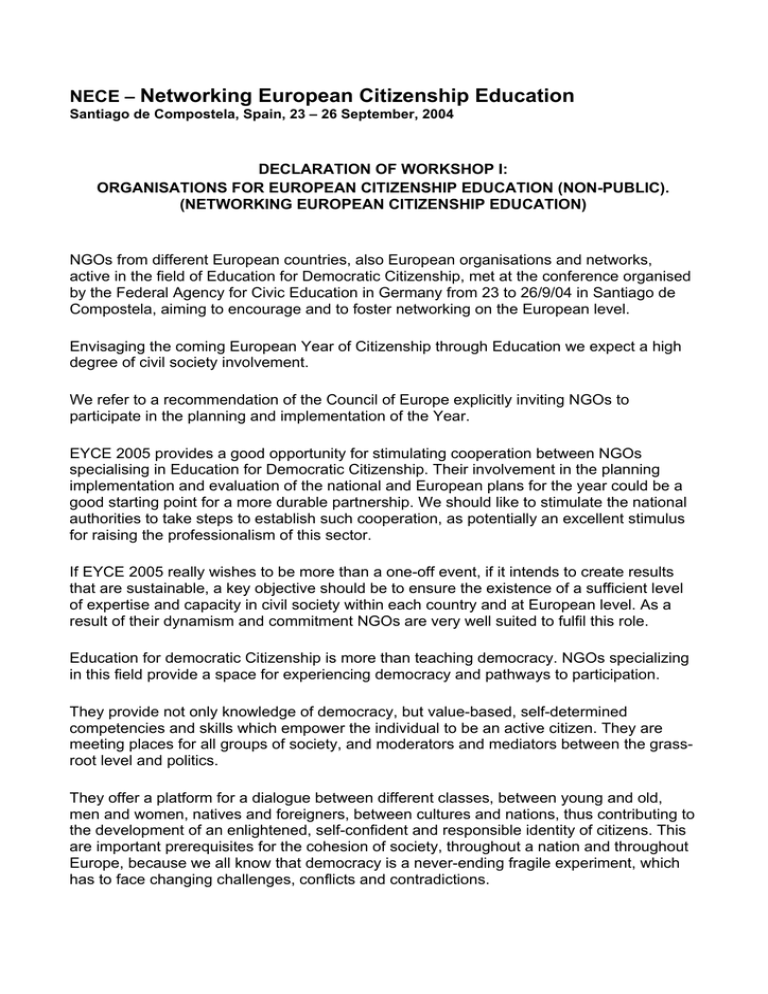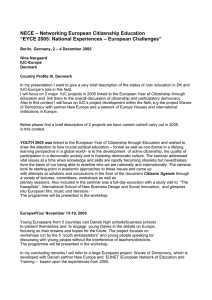Networking European Citizenship Education NECE –
advertisement

NECE – Networking European Citizenship Education Santiago de Compostela, Spain, 23 – 26 September, 2004 DECLARATION OF WORKSHOP I: ORGANISATIONS FOR EUROPEAN CITIZENSHIP EDUCATION (NON-PUBLIC). (NETWORKING EUROPEAN CITIZENSHIP EDUCATION) NGOs from different European countries, also European organisations and networks, active in the field of Education for Democratic Citizenship, met at the conference organised by the Federal Agency for Civic Education in Germany from 23 to 26/9/04 in Santiago de Compostela, aiming to encourage and to foster networking on the European level. Envisaging the coming European Year of Citizenship through Education we expect a high degree of civil society involvement. We refer to a recommendation of the Council of Europe explicitly inviting NGOs to participate in the planning and implementation of the Year. EYCE 2005 provides a good opportunity for stimulating cooperation between NGOs specialising in Education for Democratic Citizenship. Their involvement in the planning implementation and evaluation of the national and European plans for the year could be a good starting point for a more durable partnership. We should like to stimulate the national authorities to take steps to establish such cooperation, as potentially an excellent stimulus for raising the professionalism of this sector. If EYCE 2005 really wishes to be more than a one-off event, if it intends to create results that are sustainable, a key objective should be to ensure the existence of a sufficient level of expertise and capacity in civil society within each country and at European level. As a result of their dynamism and commitment NGOs are very well suited to fulfil this role. Education for democratic Citizenship is more than teaching democracy. NGOs specializing in this field provide a space for experiencing democracy and pathways to participation. They provide not only knowledge of democracy, but value-based, self-determined competencies and skills which empower the individual to be an active citizen. They are meeting places for all groups of society, and moderators and mediators between the grassroot level and politics. They offer a platform for a dialogue between different classes, between young and old, men and women, natives and foreigners, between cultures and nations, thus contributing to the development of an enlightened, self-confident and responsible identity of citizens. This are important prerequisites for the cohesion of society, throughout a nation and throughout Europe, because we all know that democracy is a never-ending fragile experiment, which has to face changing challenges, conflicts and contradictions. There can be no credible lifelong learning without including education for a democratic, active citizenship as an integral part of the system . We therefore appeal for resources to be made available for a sustainable work. In many European countries NGOs concentrating on Education for Democratic Citizenship find themselves in a continuous struggle for survival, which in itself results in too much time and effort being spent on finding resources, thus endangering continuity and quality. It is highly desirable that a stable support infrastructure for such NGOs be put in place by national authorities, and that this is complemented at European level by a mechanism providing stable support for networks for such NGOs. We hope that after EYCE 2005 the Council of Europe, the European Commission as well as national authorities will launch a new phase of the big project of Education for Democracy .This next phase should emphasize capacity-building, i.e. raising the expertise and capacity of civil society actors in Education for Democratic Citizenship.





